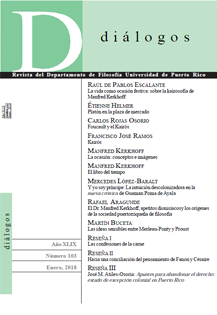Resumen
The present essay is based on a reading of a few crucial passages of Spinoza‘s Ethics. I will try to show that in this work, Spinoza makes a profound transformation to three key concepts. 1) The modern era‘s notion of reason; 2) a strictly philosophical (meaning, not theological) recovery of the concept of God; and 3) a surprising reelaboration of the concept of substance. This is all done by taking as our point of departure and rule of thumb that what we call 'mind and body‘ does not in the slightest differ from what we call 'nature.‘ However, when it comes to thinking, analyzing, and understanding the manifold or infinite differences that constitute the one and only plane of reality, two different perspectives open up before us: that of eternity and of temporality (that of the temporal). At the same time, both converge in their decisive and critical point in which philosophical experience is assumed as a writing practice and an honorable way of life that is not only concerned with speculative thinking. From there I will tackle the trajectory of the concepts of intuitive science and of beatitude, which gives name to this essay.Descargas
Los datos de descargas todavía no están disponibles.

